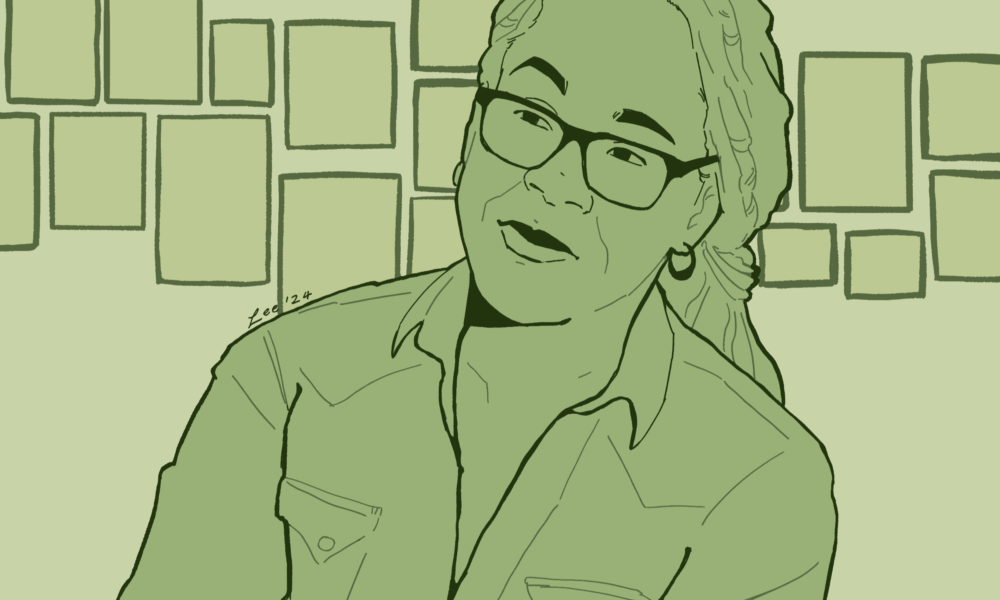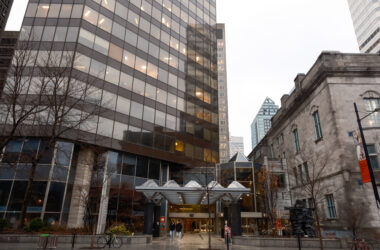On Oct. 24, approximately two dozen academics gathered in Room W-215 of the Arts Building to hear Deanna Bowen, assistant professor in Concordia’s Department of Studio Arts, speak about her research-creation practice and art exhibits, her family’s history with racism in Canada, and anti-Black sentiment in the art history world. The event is the first of McGill’s Art History and Communication Studies (AHCS) Speaker Series 2024-25, organized by department assistant professors Kenji Praepipatmongkol and Bobby Benedicto.
In an interview with The Tribune, Praepipatmongkol explained the department’s motivations for organizing this year’s speaker series.
“This semester in particular, there’s a few of us [including] myself [and] Reilley Bishop-Stall who are teaching courses on modern contemporary art and visual culture […] with an interest in the histories of ethnicity in relation to art history [and the] racialization of art. So it felt particularly appropriate to invite Deanna,” Praepipatmongkol said.
After a brief introduction from Praepipatmongkol, Bowen explained that her work is largely motivated by her own family’s silence on the anti-Black racism they experienced in Canada. She then turned to focus on the story of her fluke discovery of a 1911 anti-Black petition from Edmonton, which had requested that former Prime Minister Wilfrid Laurier limit the immigration of Black individuals into western Canada and called for a violent white mob rule. On the petition, Bowen found an unexpected signatory: Barker Fairley, a prominent Canadian artist and proponent of the Group of Seven, a collective of famed Canadian landscape painters. Bowen proceeded to reach out to the University of Alberta—which hosted many of Fairley’s works—to cross-check Fairley’s signature with that of his art pieces. She found the signatures to be a match.
“It begs the question: What does it mean? […] What does it mean if this man was willing to sign a petition calling for mob killing of Black and Indigenous people, and then what does that say about the Group of Seven and the work that they produce?” Bowen asked the audience.
Bowen also discussed the violent settler-colonial history of Kitchener, Ontario—formerly called Berlin, Ontario—and how it led to her subsequent project: Black Drones in the Hive.
“It is a site-specific archive based project that looks at the overlapping Black, Indigenous, and white histories of the region surrounding the Kitchener-Waterloo Art Gallery,” Bowen wrote in a statement to The Tribune. “The region is the site of numerous wars between the British and America, postwar German settlement, industrial innovation, anti-Slavery abolition, Black settlement and the Canadian terminus of the Underground Railway.”
Bowen’s next project, Conceptions of White, includes select artworks that illustrate white origin myths and how the historical foundation of the white man’s burden fuels white guilt and supremacy in the contemporary context. Bowen touched on the violent response she got when the project came out.
“I was just decimated in the press. I’ve never met any of the white people that came out against me,” Bowen said. “All that mattered in their white male minds was that I blasphemed the Group of Seven [….] I’m telling you, the violence changed my life. I live my life differently now because of the amount of hatred that came at me in producing this work.”
Abigail Celis, assistant professor in decolonial Art History and Museum Studies at the Université de Montréal, was present in the audience. She spoke to The Tribune about what she hopes art history academics take away from Bowen’s talk.
“I think the whole questioning of what is the narrative of Canadian art history, who is it protecting, [and] who is it invisibilizing is something to take away,” Celis said.
Bowen will be the first tenured Black Studio Arts professor in Canada. She touched on the monumentality of the matter.
“The truth of the matter is that Blackness is a very late addition to Canadian cultural discussions. Most of the new Black faculty entering Canadian institutions were hired in response to Dereck Chauvin’s killing of George Floyd,” Bowen wrote. “At the same time, I am thrilled to be the first Black professor to many of my students. I didn’t have that when I went to school, [but it] would have made a world of difference.”









